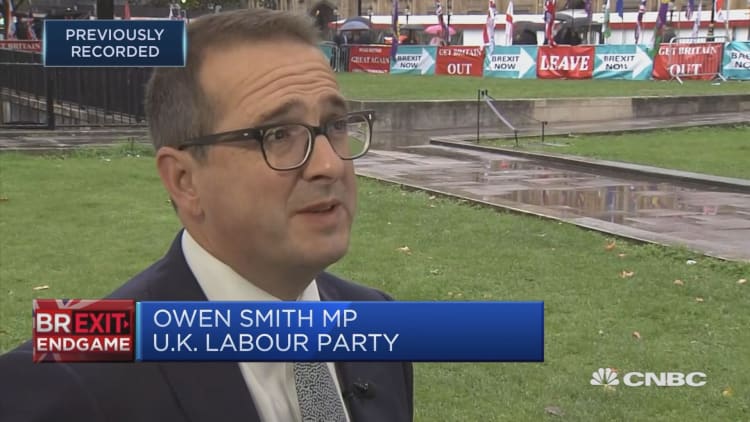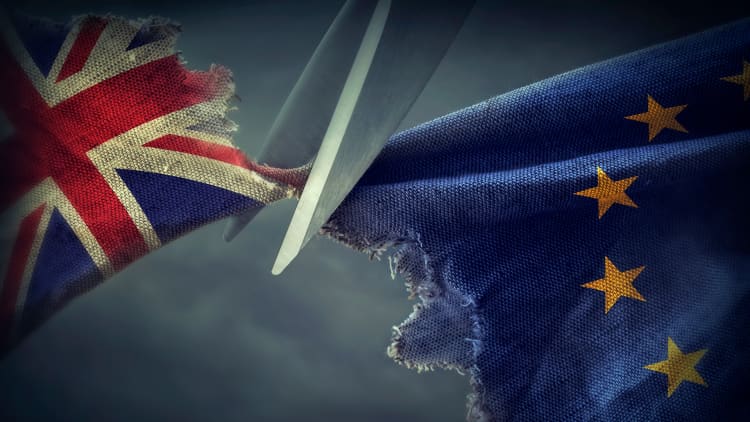The British pound has seen a wild day of trading amid reports of progress and obstacles during a last day of Brexit talks between the U.K. and EU.
Negotiating teams from both sides are still locked in discussions with hopes that a deal could be reached before a crucial EU summit later this week.
A deal needs to be reached Wednesday if it stands any chance of being approved by the EU, and then by the U.K. Parliament at the weekend. If a deal is not approved by October 19, U.K. Prime Minister Boris Johnson is legally obliged to ask the EU for an extension to the current departure date of October 31.
On Wednesday afternoon, sterling rose above $1.28 on a report that the main obstacle to a Brexit deal had been removed. It briefly touched a new five-month high of $1.2840 after a reporter for Irish broadcaster RTE, citing European Union sources, said opposition from Northern Ireland's Democratic Unionist Party (DUP) to new Brexit proposals had been overcome. This was later dismissed by the party's leader, however.
The currency and U.K. stocks had fallen earlier in the day on other media reports which suggested that talks had stalled over a future trade deal and fair competition clauses, as well as renewed concerns from the DUP.
Irish Prime Minister Leo Varadkar also confirmed that there were still outstanding issues, particularly surrounding Northern Ireland, that were "yet to be resolved" and that talks may need more time.
"There is a pathway to a possible deal but there are many issues that still need to be fully resolved, particularly around the consent mechanism and also some issues around customs and VAT," Varadkar said in a speech, according to Reuters.
He added that there was the possibility of an additional EU summit before the departure date of October 31 if necessary.

Irish border issue
There were reports a deal was imminent on Tuesday after the U.K. had made concessions over the Irish border issue and customs arrangements which have proved the stickiest points preventing an agreement so far.
The U.K. proposed alternative arrangements to the so-called Irish "backstop" several weeks ago and these are the focal point of last-minute talks. The backstop was an insurance policy designed to prevent a hard border on the island of Ireland if the U.K. and EU failed to agree a trade deal in a 21-month transition period.
Brexiteers and politicians in Northern Ireland's Democratic Unionist Party hadn't liked the backstop as they saw it as keeping Northern Ireland, a part of the U.K., more aligned with the EU.
Johnson's new plan would've seen Northern Ireland largely stay in the EU's single market but leave the customs union, necessitating customs checks on goods entering the EU from Northern Ireland and the U.K.. However there are reports that this plan may have been tweaked following recent talks with EU negotiators.

The U.K. had suggested customs checks away from the border to prevent physical infrastructure, which all sides want to avoid in order to maintain free movement between Northern Ireland and the Republic of Ireland.
Johnson spent 90 minutes in discussions with Arlene Foster, the leader of the DUP, on Tuesday night but her party is reportedly unhappy with new plans to put a customs border in the Irish Sea.
The DUP said Tuesday that more work needed was needed before it would back a deal and said Northern Ireland must remain in a customs union with the U.K.
If a deal is reached, EU leaders will have to ratify it at their summit on Thursday and Friday, then it will have to be approved by a majority of U.K. lawmakers at a special parliamentary summit on Saturday. The European Parliament would also have to approve any Brexit deal too.
British MPs had rejected a Brexit deal arrived at by previous Prime Minister Theresa May three times largely because of objections to the Irish "backstop."


